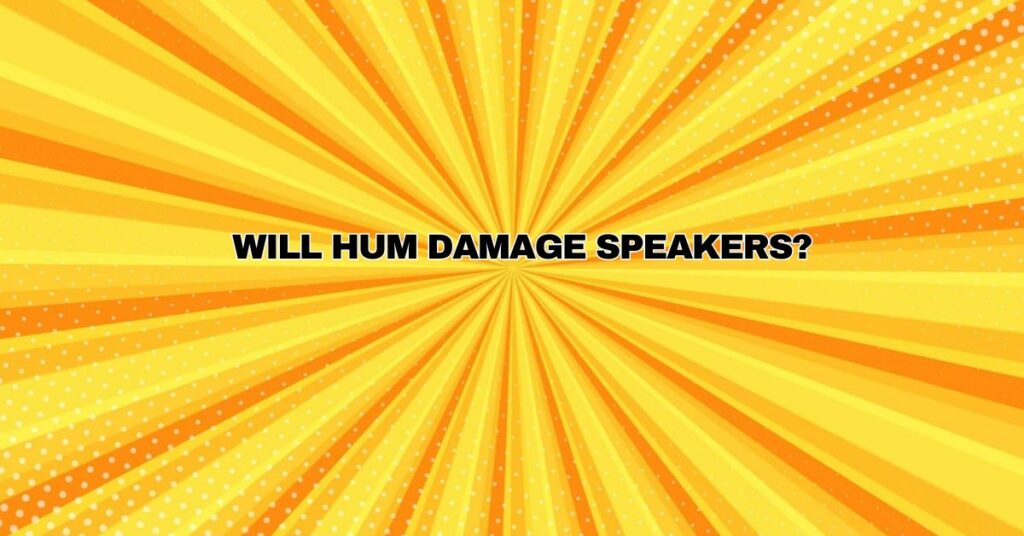The distinctive and often bothersome hum or buzzing emanating from speakers can be a source of frustration for audio enthusiasts. It’s a phenomenon that can disrupt the enjoyment of music, movies, and other audio experiences. But the question that lingers is whether this hum, which can sometimes seem like a minor annoyance, has the potential to harm your speakers in the long run. In this comprehensive article, we will delve into the intricacies of speaker hum, its causes, and the impact it may have on your audio equipment.
The Nature of Speaker Hum
Before we explore the potential damage, it’s essential to understand what speaker hum is and what typically causes it:
Speaker Hum
Speaker hum is characterized by a low-frequency noise, often described as a humming, buzzing, or low-level background noise that emerges from speakers. It’s a result of unwanted interference or disturbances in the audio signal path, typically occurring in response to external factors. While hum itself is an audio anomaly and can be distracting, it is not inherently harmful to your speakers.
Common Causes of Speaker Hum
Several factors can give rise to speaker hum:
- Electrical Interference: Devices such as mobile phones, Wi-Fi routers, fluorescent lights, and other electronic equipment emit electromagnetic interference (EMI) or radio-frequency interference (RFI). These can infiltrate the audio signal path and lead to hum.
- Ground Loops: Ground loops occur when there are multiple paths to ground in an audio system, resulting in voltage differences and potential noise. Ground loops are a frequent source of speaker hum.
- Cable Issues: Loose or damaged cable connections, frayed wires, or cables routed near power sources can introduce noise into the audio signal path.
- Amplifier or Receiver Problems: Equipment issues, such as malfunctioning amplifiers or receivers, can result in distorted audio signals, including speaker hum.
Can Speaker Hum Damage Speakers?
The direct impact of speaker hum on your speakers is typically negligible. However, there are indirect ways in which speaker hum could potentially lead to harm:
- Overdriving Speakers: Some individuals may increase the volume on their amplifiers or receivers in an attempt to compensate for the hum. This can lead to overdriving the speakers, potentially causing damage such as voice coil overheating, which, over time, may harm the speakers.
- Neglecting Underlying Problems: Speaker hum is often a symptom of other issues within the audio system. Neglecting to address these problems can potentially lead to equipment damage over time, affecting both speakers and amplifiers.
- Reduced Listening Experience: While not directly related to speaker damage, prolonged exposure to speaker hum can negatively impact your listening experience and satisfaction, which is an indirect effect of hum.
Preventive Measures
To prevent potential harm to your speakers and audio equipment due to speaker hum, consider the following preventive measures:
- Identify and Address Underlying Issues: Investigate and resolve the root causes of speaker hum. This may include eliminating electrical interference, addressing ground loops, and ensuring all cable connections are secure and in good condition.
- Use High-Quality Cables: Invest in high-quality audio cables that are shielded to minimize interference. Proper cable management can also help prevent issues.
- Implement Grounding Solutions: To address ground loops, you can use ground-lift adapters on power cords or employ ground isolators. However, it’s essential to understand the potential safety implications and consult a professional if necessary.
- Regular Maintenance: Perform regular maintenance on your audio equipment, including cleaning connectors and controls. Keep an eye on the overall condition of your speakers and components.
- Safe Volume Levels: Avoid overdriving your speakers to compensate for hum. Use safe and reasonable volume levels to prevent potential speaker damage.
- Professional Assistance: If you’re unable to identify or resolve the issues leading to speaker hum, consider seeking professional help from an audio technician or electrician who can assess your specific setup and provide tailored solutions.
Conclusion
In most cases, speaker hum itself is not directly harmful to your speakers. Instead, it serves as an indicator of underlying issues within your audio system that need attention. However, there are indirect risks, such as potential damage from overdriving speakers and decreased listening satisfaction.
By understanding the causes of speaker hum and taking preventive measures, you can ensure the longevity and health of your speakers, amplifiers, and other audio equipment. Addressing the hum not only enhances your listening experience but also safeguards your valuable audio equipment. Ultimately, while speaker hum may not harm your speakers, it’s a sign that should not be ignored, and addressing the underlying problems is key to maintaining a high-quality audio experience.


